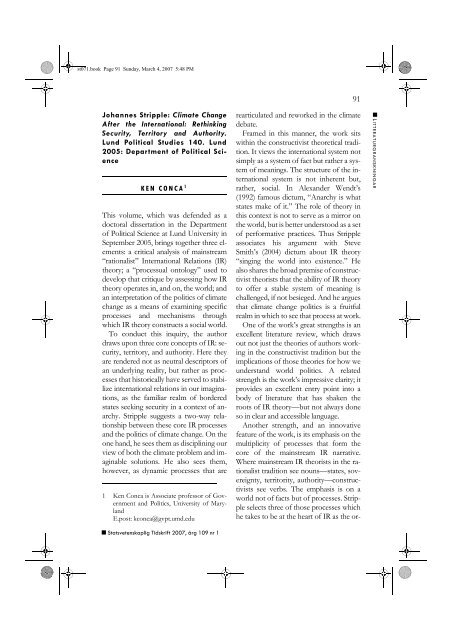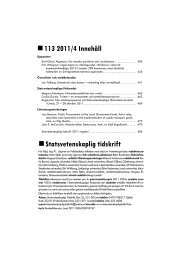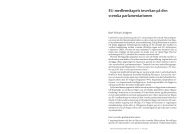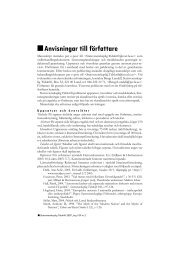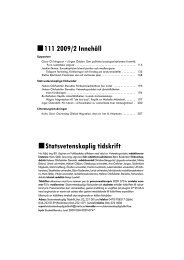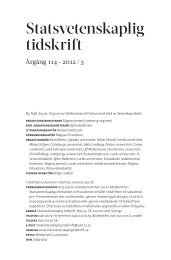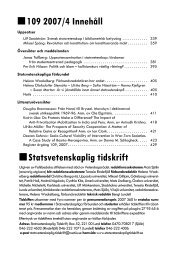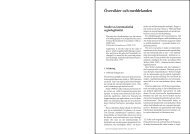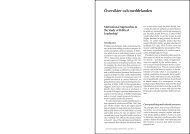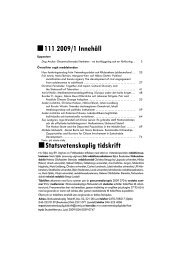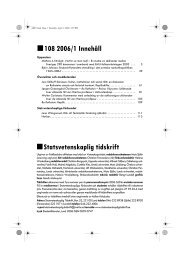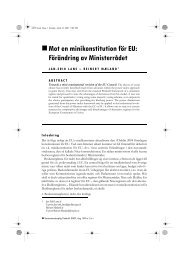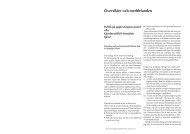Hela nummer 2007/1 (PDF, 2047 kb) - Statsvetenskaplig tidskrift
Hela nummer 2007/1 (PDF, 2047 kb) - Statsvetenskaplig tidskrift
Hela nummer 2007/1 (PDF, 2047 kb) - Statsvetenskaplig tidskrift
Create successful ePaper yourself
Turn your PDF publications into a flip-book with our unique Google optimized e-Paper software.
st071.book Page 91 Sunday, March 4, <strong>2007</strong> 5:48 PM<br />
Johannes Stripple: Climate Change<br />
After the International: Rethinking<br />
Security, Territory and Authority.<br />
Lund Political Studies 140. Lund<br />
2005: Department of Political Science<br />
KEN CONCA 1<br />
This volume, which was defended as a<br />
doctoral dissertation in the Department<br />
of Political Science at Lund University in<br />
September 2005, brings together three elements:<br />
a critical analysis of mainstream<br />
“rationalist” International Relations (IR)<br />
theory; a “processual ontology” used to<br />
develop that critique by assessing how IR<br />
theory operates in, and on, the world; and<br />
an interpretation of the politics of climate<br />
change as a means of examining specific<br />
processes and mechanisms through<br />
which IR theory constructs a social world.<br />
To conduct this inquiry, the author<br />
draws upon three core concepts of IR: security,<br />
territory, and authority. Here they<br />
are rendered not as neutral descriptors of<br />
an underlying reality, but rather as processes<br />
that historically have served to stabilize<br />
international relations in our imaginations,<br />
as the familiar realm of bordered<br />
states seeking security in a context of anarchy.<br />
Stripple suggests a two-way relationship<br />
between these core IR processes<br />
and the politics of climate change. On the<br />
one hand, he sees them as disciplining our<br />
view of both the climate problem and imaginable<br />
solutions. He also sees them,<br />
however, as dynamic processes that are<br />
1 Ken Conca is Associate professor of Government<br />
and Politics, University of Maryland<br />
E.post: kconca@gvpt.umd.edu<br />
■ <strong>Statsvetenskaplig</strong> Tidskrift <strong>2007</strong>, årg 109 nr 1<br />
91<br />
rearticulated and reworked in the climate<br />
debate.<br />
Framed in this manner, the work sits<br />
within the constructivist theoretical tradition.<br />
It views the international system not<br />
simply as a system of fact but rather a system<br />
of meanings. The structure of the international<br />
system is not inherent but,<br />
rather, social. In Alexander Wendt’s<br />
(1992) famous dictum, “Anarchy is what<br />
states make of it.” The role of theory in<br />
this context is not to serve as a mirror on<br />
the world, but is better understood as a set<br />
of performative practices. Thus Stripple<br />
associates his argument with Steve<br />
Smith’s (2004) dictum about IR theory<br />
“singing the world into existence.” He<br />
also shares the broad premise of constructivist<br />
theorists that the ability of IR theory<br />
to offer a stable system of meaning is<br />
challenged, if not besieged. And he argues<br />
that climate change politics is a fruitful<br />
realm in which to see that process at work.<br />
One of the work’s great strengths is an<br />
excellent literature review, which draws<br />
out not just the theories of authors working<br />
in the constructivist tradition but the<br />
implications of those theories for how we<br />
understand world politics. A related<br />
strength is the work’s impressive clarity; it<br />
provides an excellent entry point into a<br />
body of literature that has shaken the<br />
roots of IR theory—but not always done<br />
so in clear and accessible language.<br />
Another strength, and an innovative<br />
feature of the work, is its emphasis on the<br />
multiplicity of processes that form the<br />
core of the mainstream IR narrative.<br />
Where mainstream IR theorists in the rationalist<br />
tradition see nouns—states, sovereignty,<br />
territority, authority—constructivists<br />
see verbs. The emphasis is on a<br />
world not of facts but of processes. Stripple<br />
selects three of those processes which<br />
he takes to be at the heart of IR as the or-<br />
■ L ITTERATURGRANSKNINGAR


